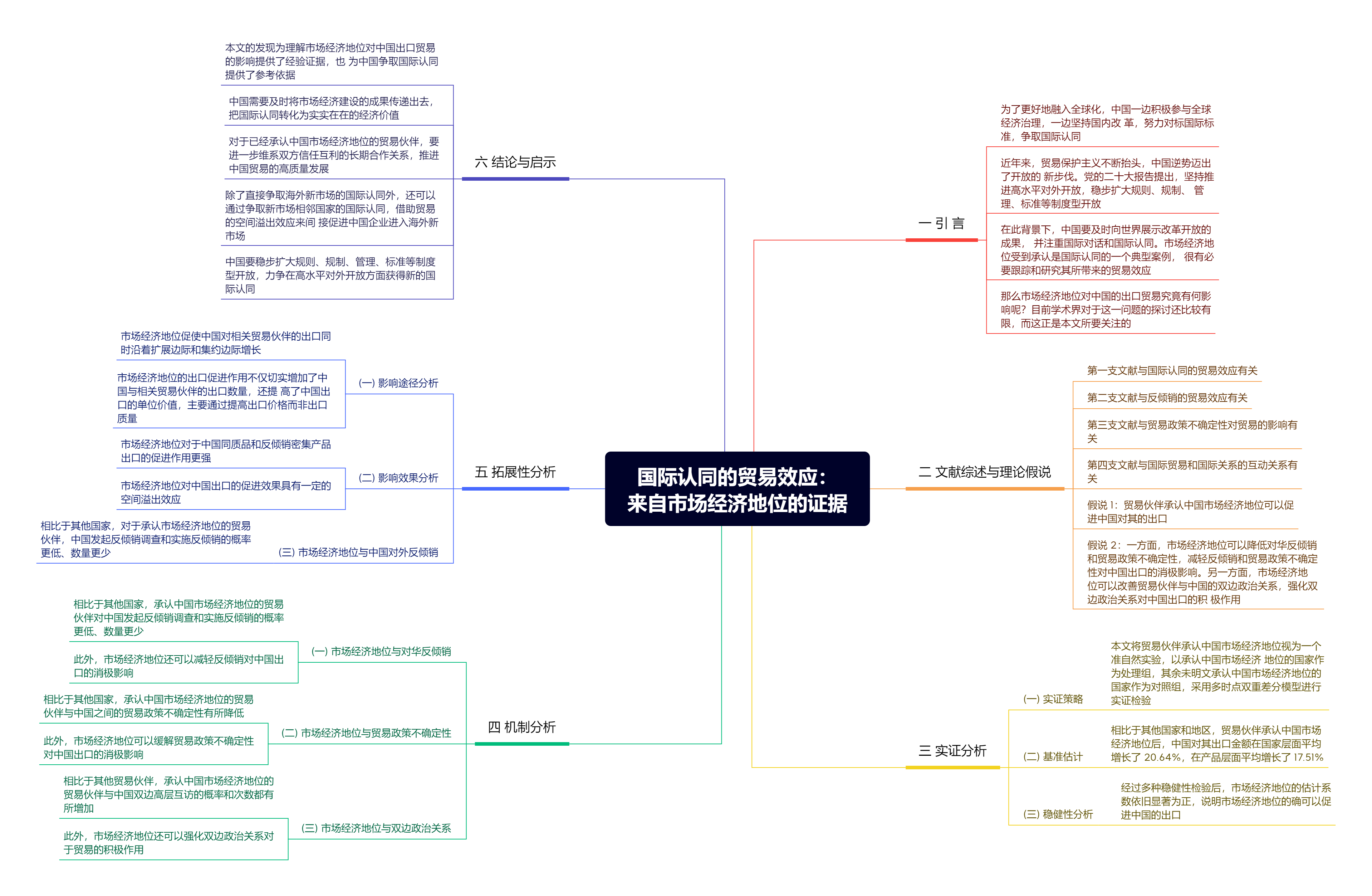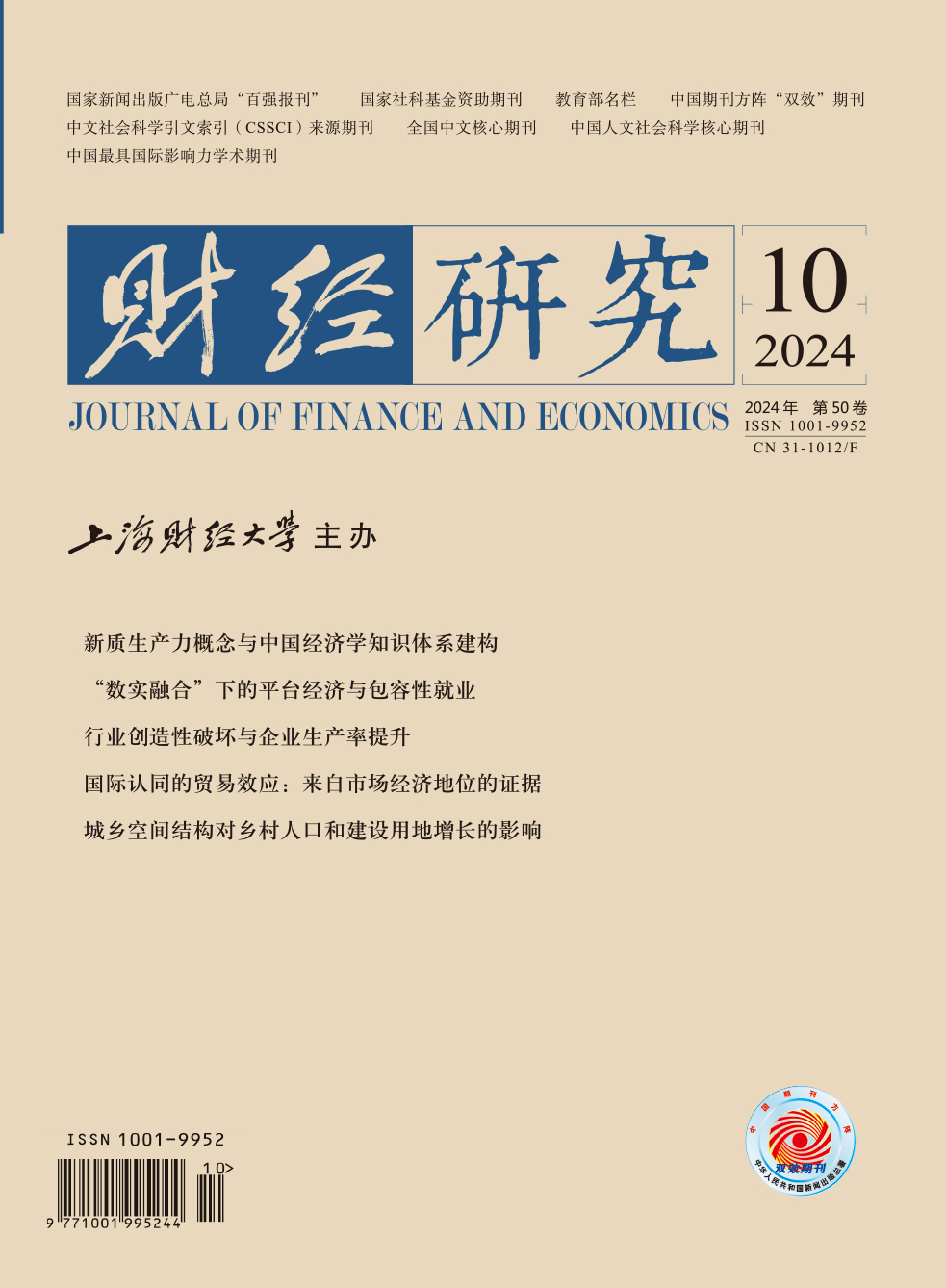为了理解国际贸易认同对中国出口贸易的影响,文章使用2002—2017年中国出口贸易数据,以市场经济地位为例,检验了国际认同的贸易效应。研究发现,相比于其他国家和地区,贸易伙伴承认中国市场经济地位后,中国对其出口显著增加,这一结论在经过一系列稳健性检验后依旧成立。机制研究发现:一方面,市场经济地位可以减少贸易伙伴对华反倾销以及中国面临的贸易政策不确定性,减轻反倾销和贸易政策不确定性对中国出口的消极影响;另一方面,市场经济地位也可以改善贸易伙伴与中国的双边政治关系,强化双边政治关系对中国出口的积极作用。影响途径的分析表明:市场经济地位可以同时沿着扩展边际和集约边际促进中国出口增长,主要通过提高数量和提升价格促进出口增长,但对出口质量影响不显著。影响效果的分析表明:市场经济地位对中国出口的促进作用对于同质品和反倾销密集的产品更明显,且该作用具有一定的空间溢出效应;此外,市场经济地位同时降低了中国对贸易伙伴的反倾销,有助于双方形成良好的经贸关系。文章的发现为理解市场经济地位对中国出口贸易的影响提供了经验证据,也为中国争取国际认同提供了参考依据。
国际认同的贸易效应:来自市场经济地位的证据
摘要
参考文献
相关附件
思维导图
5 施炳展. 文化认同与国际贸易[J]. 世界经济,2016,(5):78−97.
10 闫雪凌,林建浩. 领导人访问与中国对外直接投资[J]. 世界经济,2019,(2):147−169.
11 赵瑾. “非市场经济条款”与完善我国市场经济体制[J]. 世界经济与政治,2004,(10):63−68.
12 Albornoz F,Pardo H F C,Corcos G,et al. Sequential exporting[J]. Journal of International Economics,2012,88(1):17−31. DOI:10.1016/j.jinteco.2012.02.007
13 Bailey M A,Strezhnev A,Voeten E. Estimating dynamic state preferences from united nations voting data[J]. Journal of Conflict Resolution,2017,61(2):430−456. DOI:10.1177/0022002715595700
14 Berger D,Easterly W,Nunn N,et al. Commercial imperialism? Political influence and trade during the cold war[J]. American Economic Review,2013,103(2):863−896. DOI:10.1257/aer.103.2.863
15 Bown C P. China's WTO entry:Antidumping,safeguards,and dispute settlement[J]. NBER Working Paper,2007,13349.
16 Bown C P,Crowley M A. Trade deflection and trade depression[J]. Journal of International Economics,2007,72(1):176−201. DOI:10.1016/j.jinteco.2006.09.005
17 Broda C,Weinstein D E. Globalization and the gains from variety[J]. Quarterly Journal of Economics,2006,121(2):541−584. DOI:10.1162/qjec.2006.121.2.541
18 Burchardi K B,Chaney T,Hassan T A. Migrants,ancestors,and foreign investments[J]. Review of Economic Studies,2019,86(4):1448−1486. DOI:10.1093/restud/rdy044
19 Chandra P. Impact of temporary trade barriers:Evidence from China[J]. China Economic Review,2016,38(4):24−48.
20 Chandra P. Trade destruction and trade diversion:Evidence from China[J]. China & World Economy,2017,25(3):31–59.
21 Chang P,Fujii T,Jin W. Good names beget favors:The impact of country image on trade flows and welfare[J]. Management Science,2022,68(10):7555−7596. DOI:10.1287/mnsc.2021.4250
22 Che Y,Du J,Lu Y,et al. Once an enemy,forever an enemy? The long-run impact of the Japanese invasion of China from 1937 to 1945 on trade and investment[J]. Journal of International Economics,2015,96(1):182−198. DOI:10.1016/j.jinteco.2015.01.001
23 Choi J,Hyun J,Park Z. Bound by ancestors:Immigration,credit frictions,and global supply chain formation[J]. Journal of International Economics,2024,147:103855.
24 Combes P,Lafourcade M,Mayer T. The trade-creating effects of business and social networks:Evidence from France[J]. Journal of International Economics,2005,66(1):1−29. DOI:10.1016/j.jinteco.2004.07.003
25 Disdier A,Mayer T. Je t’aime,moi non plus:Bilateral opinions and international trade[J]. European Journal of Political Economy,2007,23(4):1140−1159. DOI:10.1016/j.ejpoleco.2006.09.021
26 Egger P,Nelson D. How bad is antidumping? Evidence from panel data[J]. Review of Economics and Statistics,2011,93(4):1374−1390. DOI:10.1162/REST_a_00132
27 Fan H,Li Y A,Yeaple S R. Trade liberalization,quality,and export prices[J]. Review of Economics and Statistics,2015,97(5):1033−1051. DOI:10.1162/REST_a_00524
28 Felbermayr G,Sandkamp A. The trade effects of anti-dumping duties:Firm-level evidence from China[J]. European Economic Review,2020,122:103367. DOI:10.1016/j.euroecorev.2019.103367
29 Felbermayr G J,Toubal F. Cultural proximity and trade[J]. European Economic Review,2010,54(2):279−293. DOI:10.1016/j.euroecorev.2009.06.009
30 Feng L,Li Z,Swenson D L. Trade policy uncertainty and exports:Evidence from China's WTO accession[J]. Journal of International Economics,2017,106(5):20−36.
31 Fuchs A,Klann N. Paying a visit:The Dalai Lama effect on international trade[J]. Journal of International Economics,2013,91(1):164−177. DOI:10.1016/j.jinteco.2013.04.007
32 Guiso L,Sapienza P,Zingales L. Cultural biases in economic exchange?[J]. Quarterly Journal of Economics,2009,124(3):1095−1131. DOI:10.1162/qjec.2009.124.3.1095
33 Hadjiyiannis C,Heracleous M S,Tabakis C. Regionalism and conflict:Peace creation and peace diversion[J]. Journal of International Economics,2016,102:141−159. DOI:10.1016/j.jinteco.2016.07.001
34 Handley K,Limao N. Trade and investment under policy uncertainty:Theory and firm evidence[J]. American Economic Journal:Economic Policy,2015,7(4):189−222. DOI:10.1257/pol.20140068
35 Handley K,Limao N. Policy Uncertainty,trade,and welfare:Theory and evidence for China and the United States[J]. American Economic Review,2017,107(9):2731−2783. DOI:10.1257/aer.20141419
36 Handley K. Exporting under trade policy uncertainty:Theory and evidence[J]. Journal of International Economics,2014,94(1):50−66. DOI:10.1016/j.jinteco.2014.05.005
37 Hellmanzik C,Schmitz M. Virtual proximity and audiovisual services trade[J]. European Economic Review,2015,77(7):82−101.
38 Khandelwal A. K,Schott P K,Wei S. Trade liberalization and embedded institutional reform:Evidence from Chinese exporters[J]. American Economic Review,2013,103(6):2169−2195. DOI:10.1257/aer.103.6.2169
39 Kim H,Ahn D. Empirical evidence on surrogate country method for non-market economy:US anti-dumping policy towards China[J]. The World Economy,2019,42(8):2452−2466. DOI:10.1111/twec.12804
40 Lu Y,Gu W,Zeng K. Does the belt and road initiative promote bilateral political relations?[J]. China & World Economy,2021,29(5):57−83.
41 Lu Y,Tao Z,Zhang Y. How do exporters respond to antidumping investigations?[J]. Journal of International Economics,2013,91(2):290−300. DOI:10.1016/j.jinteco.2013.08.005
42 Mansfield E D,Bronson R. Alliances,preferential trading arrangements,and international trade[J]. American Political Science Review,1997,91(1):94−107. DOI:10.2307/2952261
43 Martin P,Mayer T,Thoenig M. Make trade not war?[J]. Review of Economic Studies,2008,75(3):865−900. DOI:10.1111/j.1467-937X.2008.00492.x
44 Martin P,Mayer T,Thoenig M. The geography of conflicts and regional trade agreements[J]. American Economic Journal:Macroeconomics,2012,4(4):1−35. DOI:10.1257/mac.4.4.1
45 Melitz J,Toubal F. Native language,spoken language,translation and trade[J]. Journal of International Economics,2014,93(2):351−363. DOI:10.1016/j.jinteco.2014.04.004
46 Melitz M J. The impact of trade on intra-industry reallocations and aggregate industry productivity[J]. Econometrica,2003,71(6):1695−1725. DOI:10.1111/1468-0262.00467
47 Nitsch V. State visits and international trade[J]. World Economy,2007,30(12):1797−1816. DOI:10.1111/j.1467-9701.2007.01062.x
48 Pierce J R,Schott P K. The surprisingly swift decline of US manufacturing employment[J]. American Economic Review,2016,106(7):1632−1662. DOI:10.1257/aer.20131578
49 Pollins B M. Does trade still follow the flag?[J]. American Political Science Review,1989,83(2):465−480. DOI:10.2307/1962400
50 Rauch J E,Trindade V. Ethnic Chinese networks in international trade[J]. Review of Economics and Statistics,2002,84(1):116−130. DOI:10.1162/003465302317331955
51 Rauch J E. Networks versus markets in international trade[J]. Journal of International Economics,1999,48(1):7−35. DOI:10.1016/S0022-1996(98)00009-9
52 Sandkamp A,Yalcin E. Different antidumping legislations within the WTO:What can we learn from China's varying Market Economy Status?[J]. Review of International Economics,2021,29(5):1121−1147. DOI:10.1111/roie.12538
53 Sandkamp A. The trade effects of antidumping duties:Evidence from the 2004 EU enlargement[J]. Journal of International Economics,2020,123:103307. DOI:10.1016/j.jinteco.2020.103307
54 Urdinez F,Masiero G. China and the WTO:Will the Market Economy Status make any difference after 2016?[J]. The Chinese Economy,2015,48(2):155−172. DOI:10.1080/10971475.2015.993228
55 Vicard V. Trade,conflict,and political integration:Explaining the heterogeneity of regional trade agreements[J]. European Economic Review,2012,56(1):54−71. DOI:10.1016/j.euroecorev.2011.06.003
引用本文
罗长远, 李铮. 国际认同的贸易效应:来自市场经济地位的证据[J]. 财经研究, 2024, 50(10): 139-153.
导出参考文献,格式为:





 2957
2957  4991
4991


